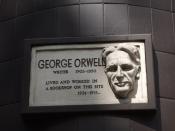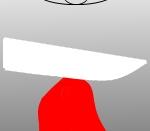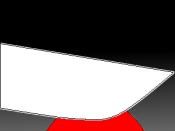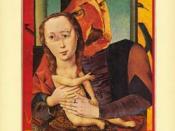Essay"Fear is a tool by which a dictator can seemingly become your friend" (Dr. Phil). This quotation signifies the advantage gained by dictators that control through fear. They are able to maintain the pretense of being a friend to those in fear because those in fear crave protection. Those in control can provide it. In the books 1984, by George Orwell and The Handmaid's Tale by Margaret Atwood, control through fear is demonstrated repeatedly through fear of the Aunts in The Handmaid's Tale and fear of other authority in 1984. This fear that each respective society feels has been taken advantage of by the dictators of the region for their own benefits. Michael Moore's documentary, 9/11 displays George Bush as a man who takes unnecessary precautions as a scheme to invoke fear into the citizens of USA in order to maintain a rigid control over them. What Bush had done is called lying to his country, about what the real situation at hand was.
Discrimination is also a prominent ploy employed by dictators to maintain a rigid control over their region. Discrimination may be seen as an example to others as to what not to do, to remain in the superior race. The proles for example in 1984 were discriminated again and served a key purpose to the Party's infallible control over Oceania. Control over a specified populace is effectively implemented in many circumstances, by means of appealing to one's fears.
An effectual ruse exploited by dictatorships across the world in order to exercise control over the populace concerned, is fear of authority. The rulers feel that by manufacturing a feared reputation for its officers or other means of authority, they can induce fear within the populace and force them into obedience. In the book, The Handmaid's Tale by Margaret Atwood, Aunts are a form of authority. Their duty is to instruct the Handmaids in formal education and their duties in their life. They also have the power to discipline, a way of maintaining their feared reputation. "â¦What I am seeing is Moira's feet, the way they looked after they'd brought her back. Her feet did not look like feet at all. They looked like drowned feet, swollen and boneless, except for the color. They looked like lungs" (Atwood 114). Moira, a handmaid has undergone torture, at the hands of the Aunts, for some misdemeanor she committed. Her feet were damaged quite extensively as revealed in this quotation "looked like drowned feet, swollen and boneless except for the color. They looked like lungs". The damage done to Moira's feet is important because it is part of the feared reputation the Aunt's have in order to force the Handmaid's to obey. What was done to her feet is torture and Moira is an example to the rest of the Handmaids as to what will be inflicted upon them, if any of them commit a misdemeanor. Fearful of the consequences to delinquency, the Handmaid's have no choice but to fall prey to the Aunt's infallible control through fear. Another method of controlling a populace through fear is constant surveillance by authority. Constant surveillance serves its purpose effectively because the populace knows that they are under scrutiny, and are fearful of the implications that are involved with disobedience. "For a moment he was tempted to take it into one of the water-closets and read it at once. But that would be shocking folly, as he well knew. There was no place where you could be more certain that the telescreens were watched continuously" (Orwell 112). In the book 1984 by George Orwell, the telescreen provided the surveillance needed to induce fear and obedience for the Oceania population. The fear is not of the telescreen itself but of whoever is operating it. Winston Smith wanted to read a note of importance to him but cannot do so in the presence telescreen. His obvious anxiety to read the note out of view of the telescreens is shown in this quotation "For a moment he was tempted to take it into one of the water-closets and read it at once. But that would be shocking folly as he well knew". He is about to read it in the water-closets but he remembers that there are telescreens in there and that to read the note there would be a "shocking folly". His fear of the Party members that watch him constantly forces Winston to plan where he can read the note without being in the direct glare of the Party's control through fear. The final method of inducing fear of authority into a populace is the status of the authority and the job it entails. For example, police is associated with authority that arrest criminals and society, knowing this may fear the police and remain obedient to them. In 1984 by George Orwell, the Thought Police were a form of authority in society that punished people for thoughtcrime. Thoughtcrime is the expressing of ideas that did not follow the doctrine of the Party. People were reluctant to commit thought crime and willing to be "magnetized" by the control of the Party. They fear the name "Thought Police" because of what their job entails. Fear of authority allows authoritarian style control to be utilized in such a way that the people under the influence of this control will fearfully obey.
Another efficient ploy utilized by dictators to control the populace through fear is inducing fear of deceptive lies. These deceptive lies are lies designed to induce fear into a being in order to maintain control over every aspect of their lives. Propaganda is a common way of spreading lies around. Propaganda does not have to display realistic information; it just has to be in the best interests of the government or whoever happens to be in control. "Then the sheep-face melted into the figure of a Eurasian soldier who seemed to be advancing, huge and terrible, his sub-machine-gun roaring, and seeming to spring out of the surface of the screenâ¦" (Orwell 17) In the book 1984 by George Orwell, propaganda is used to spread lies that are to be feared. The propaganda generally displays information about how dangerous the enemy is. The Eurasian soldier is depicted on the telescreen propaganda as "huge and terrible", when in the book it clearly states that Winston Smith, a citizen of Oceania, knew that they had been at war with Eastasia and allies with Eurasia for the past 4 years. The significance of this is that the Party has lied to those they control by telling them that they are now at war with Eurasia, and have always been at war with Eurasia and they show them pictures of a "huge and terrible" Eurasian soldier to get the citizens to feel fear. By feeling fear of this fabricated enemy, the citizens crave protection that they feel the Party could give them. In order for the Party to give them that protection, the citizens of Oceania co-operate with the control that the Party imposes upon them. Another way of creating fear of lies in order to maintain control of society is altering history. By altering history, the truth of the past is eliminated and a mere façade of the past remains, thus allowing the controllers to shape history into a history that would "boast" their deeds. "The Party claimed, of course, to have liberated the proles from bondage" (Orwell 74). In the book 1984, the Party has altered history to reveal that they "liberated the proles from bondage". By doing this they make themselves appear as a superior power over the proles and over whoever was responsible for the bondage of the proles. It is this power that the society fears; a power created by the lies inputted into history. Lies in the form of present news can also induce fear into people and force them to remain under the dictators control. An effect of this is that people think that they are in more danger than they really are. Thus they remain obedient to their oppressors in exchange for "protection". In the documentary 9/11 by Michael Moore, George Bush in the event of 9/11, decided to invade Afghanistan because according to him he was fighting a "War on terror". These words were probably enough to make the nation cower in fear. For a time, everyone must have believed that Afghanistan was to blame for 9/11. The real reason Bush invaded Afghanistan was for fossil fuel resources. He lied to his people by inducing fear of a country within them and than used that to keep people calm and craving his protection. Absorbing a lie as the truth instigates fear within people allowing the dictators to control them by taking advantage of this fear.
Arguably, the most significant method of controlling through fear employed by dictators is evoking fear of discrimination within the populace concerned. Discrimination constitutes undesirable things such as lack of freedom and perhaps even death. This is a known fact to the disciples of the controllers as a result they have come to fear discrimination. Displaying a race as weak and inferior to others is one way to instigate fear into the rest of the populace in order to maintain control. "â¦The Party taught that the proles were natural inferiors who must be kept in subjection like animalsâ¦" (Orwell 74). This quotation, obtained from George Orwell's book, 1984, tells readers that the Party's doctrine stated that proles were inferior to other races. They were to be "kept in subjection like animalsâ¦" meaning that they should be treated like animals. This is discrimination and it is robbing the proles of their freedom and forcing ignorance upon them. They know of nothing related to the Party because the Party believes the proles to be too inferior to learn their doctrine. The people that the Party control are only controlled by the fear they have of being deemed the inferior race because being discriminated would render them ignorant and force them to lose their freedom, the proles a living example. Another efficient way of manufacturing fear of discrimination is by displaying a "sect" as unable to contribute to society. By deeming a race unable to contribute to society everyone will attempt to make a contribution in order to avoid becoming a part of this inferior "sect". "Give me children, or else I die" (Atwood 75). In The Handmaids Tale one of the contributions a person, more specifically a woman could give to society, is a baby. To bear children with disabilities or to not bear children at all is considered despicable in this society. Women who fit the above conditions become unwomen and get shipped of to colonies. This is discrimination and an example to the other members of society as to what could happen if society does not receive their contributions. For men, their duties as a Commander or a doctor or even as a guard may not be satisfactorily reaping benefits to society, thus bringing about their death or some other form of discrimination. People are frightened of having a fate such as the fates mentioned above, resulting in their compliance with the controllers. Lastly fear of discrimination of a certain gender can force society to fall prey to the dictator's control. In The Handmaid's Tale, by Margaret Atwood, females are visibly discriminated. For example if a woman willingly consents to sex for the purposes of producing a baby and is unable to do so because the man she has sex with is sterile, then she is to blame. It is of no consequence that the fault resides on the man. The women are considered inferior to men thus are a scapegoat for everything. As a result of this women cooperate with the doctrine of the dictators that they otherwise might not have followed if the man could be persecuted for being sterile. The women are afraid of the consequences that come as package with discrimination thus allowing the dictators to take advantage of their fear for control. Fear of discrimination and the consequences it entails allows tyrannical style control to be operated upon people who feel they would rather avoid this discrimination.
To strengthen a flaccid control, inducement of fear is necessary thus allowing the dictator to seemingly be a friendly, superior power. Tagging authority with a disreputable, but feared prominence forces society to comply with whoever is controlling them. 1984 and The Handmaid's Tale have authority to assess and make examples of the society, sending ripples of fear through them and undying loyalty towards the controller. Michael Moore's documentary reveals the lies that must be said by a dictator in order to keep society in fear, thus making them loyal to Bush. Discrimination of women and of proles are readily seen in 1984 and The Handmaid's Tale as effective ways of making an example to the rest of society as to what should happen if they fail to bow down to the higher powers. Control through fear allows the higher powers to assume authority that one cannot dare oppose.
Essay references1984, by George OrwellThe Handmaid's Tale, by Margaret AtwoodFahrenheit 9/11, by Michael Moore





